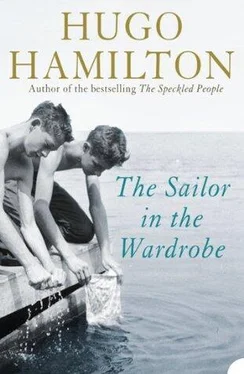‘Be careful of crowds,’ he said to me.
He made the sign of the cross but we both knew that it was too late and I was already lost. I told him I had been brainwashed by my father into speaking Irish. I had been brainwashed into being German as well and now I wanted to be brainwashed out of all that as fast as possible. Come on, brainwash me, I was saying to John Lennon, to Packer, to anyone coming along the street, to any movie that was being shown in the cinema at the time. I needed to live outside my family. I needed to be neutral and I went into hiding, behind Packer. I started to live inside his life.
My father said I had become a slacker, which is the same as what he used to say in his speeches on O’Connell Street about all the Irish people. He said I had become a borrowed personality, like some garden tool that people lend to each other and never give back. At school, it was no better, with all the brothers and teachers saying I was a nobody and a waster. It was funny because I took it as a compliment.
One day Brother K started talking to us in class about career guidance. He wanted to be a progressive educationalist and to spout on to us about how important it was to streamline. But it wasn’t long before his talk on career options became a big warning on what might become of us if we didn’t keep working hard. He turned it into a forecast of what we would all end up doing with our lives. He said Metcalf would be sweeping the streets. De Barra — bus conductor. Hurdail — civil servant. Mac an Easpaig — travelling salesman. He went around the whole class one after the other like a fortune teller, gazing into the future, imagining us in suits and ties, carrying briefcases with brochures for new refrigerators inside. He imagined some of us staring out from the scaffolding on building sites in Birmingham. He said De Pluncead would be a nightwatchman in a place called Chiswick, because he was always falling asleep in class. He said Delaney would be driving one of those red double-decker buses in circles around Trafalgar Square. O Cionnaith — playing football for the British in Doncaster. He said most of us would have to emigrate because we were too stupid to do anything else. We were knowledge-resistant, like waterproof rain-gear, unable to absorb education. Those who stayed at home would do no better. O’Bradaigh — making sausages like his father. Calthorpe did all right because he would become a famous surgeon wearing a bow tie. MacElroy did even better as a nuclear physicist and Lennihan got the best career of all as a pilot, because it meant he would be smoking Rothmans.
Brother K selected my friend Packer out for special attention, predicting that he would become a Hollywood actor.
‘Every class has a Packer,’ he said. ‘Every country has a Packer. Every moment in history has a Packer. He is your Greek God of clever words, the God on whom you pin your empty hopes. You nonentities, you will follow this man over the cliff because he fills the void inside your biscuit-tin heads.’
When it came to me, Brother K seemed to have nothing left to say. He searched in his head and could not think of any occupation or vocation that would be suitable for me, not even a meat-packer, or a greyhound trainer. He said I would be nothing. A true nobody. A waster and a tramp.
‘I’m afraid it’s park benches for you,’ he said, and the entire class let out a roar.
Every summer my father made us stay at home and study. When we got our summer holidays and everybody else was free, my father gave my brother Franz and me three days off, but then we had to go back to school in our house to study the next year’s course in advance. He wanted us to be brilliant students and drew up a school timetable for us, with maths and history and little breaks in between. While everyone else was out swimming, we had to do our essays and learn things off by heart. He would phone my mother from the office to ask her how we were getting on. He had a copy of the timetable in his briefcase, so he knew what subject we should be working on at any time. My mother became the enforcer, but then she started letting us get away with it. And one time, when Tante Minne was over on a visit, she took us down to Glendalough for the day and my father was waiting at the door when we came back, saying that we had taken time off and we now had to catch up what we had missed, even though it was after nine in the evening. So then there was a big row between Tante Minne and my father. She said that if he was going to insist on us sitting down to do our homework at that time of the night, in the middle of the summer holidays, then she would not stay there, she would leave and get a room in a hotel somewhere.
After that, my mother helped us to escape. Every time my father rang from the office, she said we were studying like good boys, even though we were outside. By the time we went back to school again after the summer, I hated it so much that I refused to do anything. My mother still helped me out and allowed me to get out of school now and again to go to the pictures in secret. I went to see Alfie and The Graduate , and Valley of the Dolls . But then I was caught and a new door-slamming war started.
My father blamed Packer. My mother wanted everything done without violence, so she sat down in the kitchen with all the sticks from the greenhouse one day and broke every one of them into little pieces over her knee with my sister Bríd crying because my mother was hurting herself, undoing all the lashes back through history. I became unpunishable.
‘Do you want to be a nobody?’ my father kept asking.
‘Yes,’ I answered. ‘That’s exactly what I want to be, a nobody.’
‘So you want to stop learning,’ he said.
I told him I wanted no more information. I wanted to be blank, without knowledge, which is the worst thing you could ever say to my father because he was a schoolteacher once and he struggled to get an education. He kept saying knowledge gives you strength and I kept saying knowledge made you weak and guilty, until he got so furious that he threw a bowl of stewed apple over my head. My mother had made it from cooking apples grown in our garden. I could see four or five black cloves floating under the surface of the green, semi-solid substance, like mines ready to explode. I saw the steam rising because it was still too hot to serve. He was blinking fast behind his glasses and when I told him I want to remain empty-headed, he picked up the bowl of Apfelkompott in the middle of the table and stood up to dump the whole lot on my head. I could feel the warm pudding sliding down around my ears. I sat there with the rest of the family looking at me while the stewed apple slipped in around my neck and I felt like a hero who had won the argument.
My mother stood up and said she should make Apfelkompott more often since we liked it so much. She was angry and the house was full of door slamming. My father then got the idea that I should go to see a psychiatrist, I was in danger of destroying the family. I refused to go and said it was him who needed a psychiatrist, but then he threatened to throw me out of the house. I had a choice, to go for treatment or become homeless. I was afraid that I was no longer in control of my own thoughts and that I was going mad. I thought I would end up mentally disturbed in an asylum with lots of people who had no power over their own minds. Once I was classified as mental, there would be no turning back.
I know my mother was not to blame for this, because she was not able to go against him. She didn’t want me to lose my imagination, so she begged me to make a compromise, which was not like capitulating entirely. She said I only had to go and talk to the man, no harm would come of that. So I went to the psychiatrist and sat there listening to this man with big lips asking me questions about myself. What does he know about being German, I thought. And when he started asking me stupid questions about what I thought of girls, I told him to fuck off. I thought he would write home and my father would find out he was paying a lot of money for somebody to listen to me telling him to fuck off, but luckily it was a confidential conversation and the letter my father got only informed him that the psychiatrist could make no great progress.
Читать дальше
Конец ознакомительного отрывка
Купить книгу












